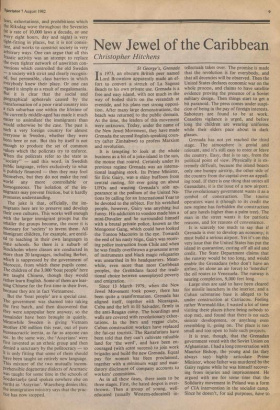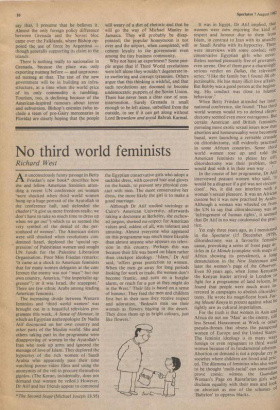New Jewel of the Caribbean
Christopher Hitchens
St George's, Grenada In 1973, an obscure British peer named Lord Brownlow apparently made an ef- fort to convert a stretch of La Sagesse Beach to his own private use. Grenada is a free and easy island, with not much in the way of boiled shirts on the verandah at eventide, and his plans met strong opposi- tion. After many large demonstrations, the beach was returned to the public domain. At the time, the leaders of this movement were unknown. Today, under the name of the New Jewel Movement, they have made Grenada the second English-speaking coun- try (after Zimbabwe) to profess Marxism and revolution.
It is tempting to look at the whole business as a bit of a joke-island in the sun, the mouse that roared. Certainly under its previous regime Grenada was an interna- tional laughing stock. Its Prime Minister, Sir Eric Gairy, was a shiny buffoon from central casting, for ever going on about UFOs and wasting Grenada's sole ap- pearance at the podium of the United Na- tions by calling for an International Year to be devoted to the subject. For his wretched people, however, Gairy was anything but funny. His addiction to voodoo made him a mini-Duvalier and he surrounded himself with a brutal private police, known as the Mongoose Gang, which could have looked the Tonton Macoutes in the eye. Towards the end of his nasty reign, Gairy was receiv- ing police instruction from Chile and when he was finally overthrown a gruesome array of instruments and black magic reliquaries was unearthed in his headquarters. Mean- while, even more than most Caribbean peoples, the Grenadans faced the tradi- tional choice between unemployed poverty and emigration. Since 13 March 1979, when the New Jewel Movement took power, there has been quite a transformation. Grenada has aligned itself, together with Nicaragua, Cuba and the left in El Salvador, firmly in the anti-Reagan camp. The hoardings and walls are covered with revolutionary exhor- tations. In the bars and reggae clubs, Cuban construction workers have replaced the fat-cat tourists. The Rastafarians have been told that they can't cultivate valuable land for 'the weed', and have been en- couraged (with scant success) to join work brigades and build the new Grenada. Equal pay for women has been proclaimed, together with a minimum wage and man- datory disclosure of company accounts to workers' committees.
As in all these cases, there seem to be three stages. First, the hated despot is over- thrown. Then a group of young, well- educated (usually Western-educated) in-
tellectuals takes over. The promise is made that the revolution is for everybody, and that all decencies will be observed. Then the United States declares economic war on the whole process, and claims to have satellite evidence proving the presence of a Soviet military design. Then things start to get a bit paranoid. The press comes under suspi- cion of being in the pay of foreign interests. Saboteurs are found to be at work. Ceaseless vigilance is urged, and before long the children are wearing uniforms while their elders pace about in dark glasses.
Grenada has not yet reached the third stage. The atmosphere is genial and tolerant, and it's still easy to enter or leave the country. Easy, that is to say, from the political point of view. Physically it is ex- tremely difficult, because the island boasts only one bumpy airstrip, the other side of the country from the capital over an appall- ing road. If there is one thing that unites all Grenadans, it is the issue of a new airport. The revolutionary government wants it as a symbol of construction. The tourist operators want it (though to its credit the new regime has forbidden the construction of any hotels higher than a palm tree). The man in the street wants it for patriotic reasons, and for reasons of convenience.
It is scarcely too much to say that if Grenada is ever to develop an economy, it must build a serious airport. Yet it's on this very issue that the United States has put the island in quarantine, cutting off all aid and credit. The State Department claims that the runway would be too long, and would enable the Grenadans (who don't have an airline, let alone an air force) to `interdict' the oil routes to Venezuela. The runway is nearing completion, 9,000 feet long.
Large sites are said to have been cleared for missile launchers in the interior, and a Cuban submarine base is alleged to be under construction at Carriacou. Feeling rather Wormald-like, I wasted a lot of time visiting these places (there being nobody to stop me), and found that there is no such sinister development, or anything even resembling it, going on. The place is too small and too open to hide such projects.
It is true, though, that the Grenadan government voted with the Soviet Union on Afghanistan. I had a long conversation with Maurice Bishop, the young and (as they always say) highly articulate Prime Minister, whose father was murdered by the Gairy regime while he was himself recover- ing from injuries and imprisonment. He argued with me for some time that the Solidarity movement in Poland was a form of CIA intervention in the socialist camp. Since he doesn't, for aid purposes, have to
say that, I presume that he believes it. Almost the only foreign policy difference between Grenada and the Soviet bloc came over the Falklands, where Bishop op- posed the use of force by Argentina though generally supporting its claim to the islands.
There is nothing really to nationalise in Grenada, because the place was only exporting nutmeg before — and unprocess- ed nutmeg at that. The test of the new government will be in building an infra- structure, at a time when the world price of its only commodity is tumbling. Tourism, too, is declining because of the American-inspired rumours about terror and subversion. Bishop's enemies (who in- clude a team of pro-Gairy mercenaries in Florida) are clearly hoping that the people will weary of a diet of rhetoric and that he will go the way of Michael Manley in Jamaica. They will probably be disap- pointed; the popular honeymoon is not over and the airport, when completed, will cement loyalty to the government even among the tiny business community.
Why not have an experiment? Some peo- ple argue that if Third World revolutions were left alone they wouldn't degenerate in- to sweltering and corrupt tyrannies. Others argue that this thinking is wishful, and that such revolutions are doomed to become undemocratic puppets of the Soviet Union. There has never been a clear case of non- intervention. Surely Grenada is small enough to be left alone, unbullied from the outside, to see if it can get along without Lord Brown low and avoid Babrak Karmal.



































 Previous page
Previous page